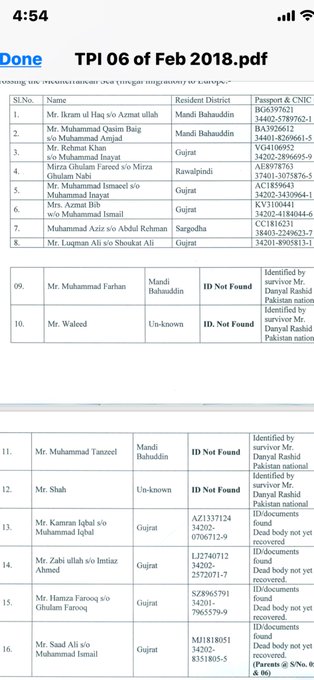ISLAMABAD: The Foreign Office (FO) said that 16 Pakistanis died in the boat sinking incident off the Libyan coast while the bodies of 12 have been recovered.
Spokesperson Dr Mohammad Faisal shared on Twitter the names and details of the Pakistanis who were on the capsized boat.
.
Eight bodies were recovered and identified while four were recovered but only identified by the deceased persons’ friends and their identification documents were yet to be found, Faisal wrote.
He further stated that documents of six individuals were found but bodies have yet to be recovered.
“[The] Pakistani Embassy [is] working around the clock,” the FO spokesperson assured in a tweet.
The International Organization for Migration believes the incident did not take place due to inclement weather as the sea was calm.
 “We know that the weather was calm, so that’s indicating that the smugglers – who are cavalier to say the least – have hugely overloaded this vessel,” Al Jazeeraquoted IOM’s Leonard Doyle as saying. “We need to get the word out to people, desperate people around the world, who think they are coming to a better life and they are reading about it on social media, that it’s not the case.”
“We know that the weather was calm, so that’s indicating that the smugglers – who are cavalier to say the least – have hugely overloaded this vessel,” Al Jazeeraquoted IOM’s Leonard Doyle as saying. “We need to get the word out to people, desperate people around the world, who think they are coming to a better life and they are reading about it on social media, that it’s not the case.”
The people whose bodies have been recovered belonged to Mandi Bahauddin, Gujrat, Rawalpindi and Sargodha areas of Punjab in Pakistan. Previously, a number of similar cases have occurred in which people — mostly from the mentioned areas of Punjab — have lost their lives en route to illegally sneaking into another country.
In November 2017, over a dozen bodies were found in Turbat, Balochistan from where people, mainly from different areas of Punjab, were trying to illegally cross the border into Iran so as to reach Europe from there for better employment opportunities.
Libyan coast
At least 90 people were feared dead in the Mediterranean Sea as they tried to undertake the treacherous journey in search of employment.
A boat carrying the migrants capsized off the coast of Zuwara in the early hours Friday, IOM spokesperson Olivia Headon confirmed to reporters in Geneva by phone from Tunis.
“At least 90 migrants are reported to have drowned, when a boat capsized off the coast of Libya this morning”, the agency had added in a statement.
Two survivors from the disaster had swum to shore, while another was rescued by a fishing boat, it had stated.
The agency has repeatedly issued warnings over the extreme dangers facing migrants who try to reach Europe via the so-called central Mediterranean route, which connects Libya to Italy.
IOM had said on Friday that more than 6,600 migrants and refugees had already entered Europe by sea since the beginning of the year, with central Mediterranean route crossings to Italy accounting for nearly 65% of the entries.
16,000 drowned
Drownings in the Mediterranean began surging in 2013 as Europe’s worst migration crisis since World War II began picking up speed, with hundreds of thousands of people fleeing war and poverty in the Middle East and elsewhere.
Over the past five years, more than 16,000 people have died trying to make the perilous crossing to Europe, according to IOM numbers.
Excluding Friday’s tragedy, 246 migrants and refugees have already died trying to cross the Mediterranean since the beginning of the year, compared to 254 casualties during the first month of 2017.
Two hundred and eighteen of those deaths occurred on the central route in 2018, IOM said, while 28 happened on the western route that links North Africa to Spain.
Meanwhile, on the eastern Mediterranean route that connects Turkey and Greece, used by 1,089 so far this year, no fatalities have yet been recorded in 2018.
The EU last year reached controversial agreements with chaos-wracked Libya to stem the flow of migrants from that country, following a more comprehensive deal with Turkey in 2016, which sharply reduced the numbers crossing to Greece.
Casualties in the eastern Mediterranean have dropped dramatically since then.
In the 22 months since the deal with Turkey was reached in April 2016, fatalities on that route have fallen to an average of 6.75 per month, from 96.25 per month during the year prior to the agreement, IOM said.




